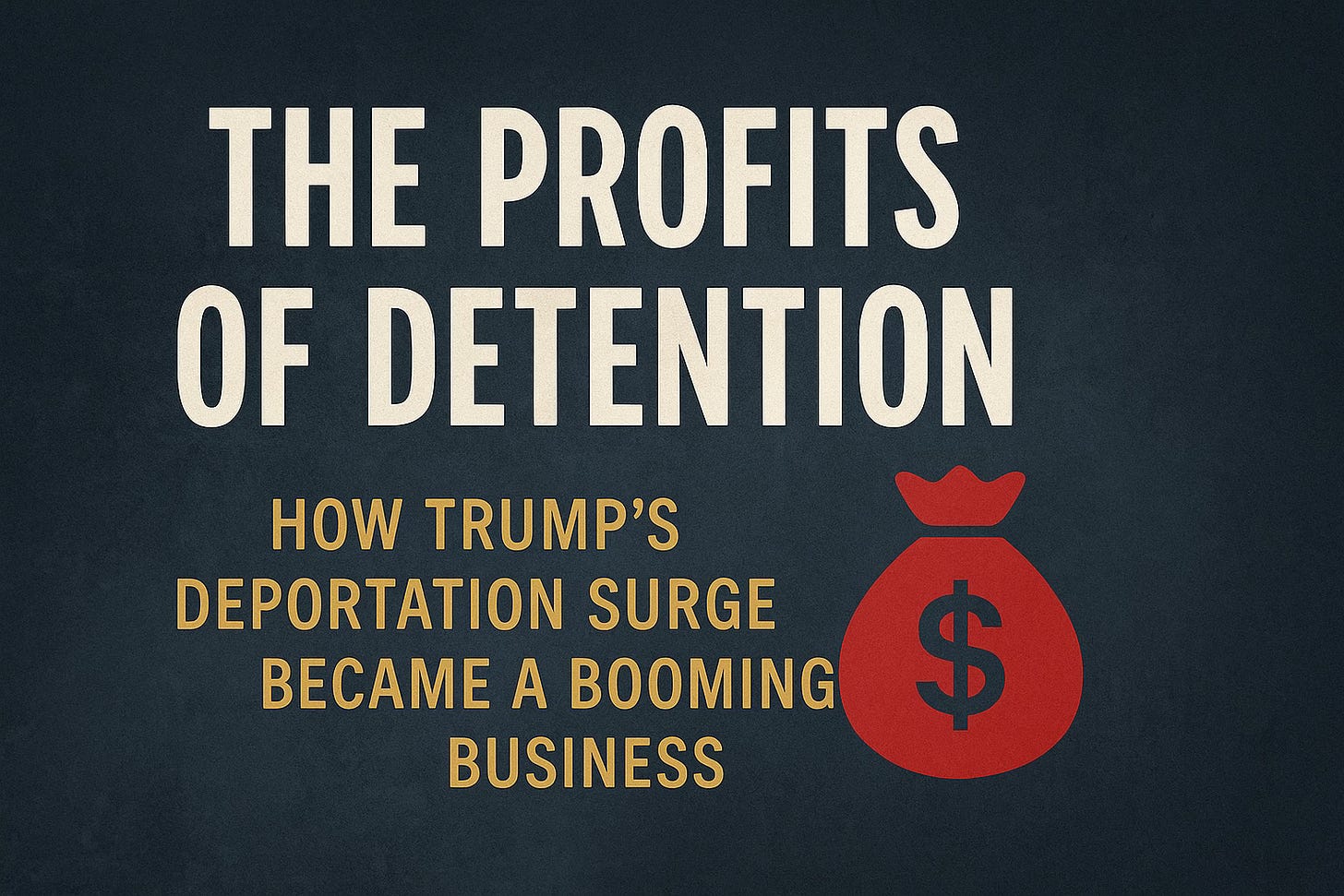"The private prison industry doesn't just profit off incarceration. It depends on it."
In 2025, as mass deportations once again surge under the Trump administration, a powerful machine hums quietly behind the headlines. It doesn't wear a badge or scream at protests. It signs contracts. It earns dividends. It reports record revenue to shareholders.
This is the business of detention—where every undocumented immigrant isn't just a person, but a paycheck.
Guaranteed Profit, Whether the Beds Are Full or Not
Under federal contracts with U.S. Immigration and Customs Enforcement (ICE), private prison operators like GEO Group and CoreCivic are paid per detention bed. These contracts include guaranteed minimums. That means even if the beds sit empty, the companies still get paid.
In 2024 alone, GEO Group reported $2.42 billion in revenue, much of it from ICE detention centers. CoreCivic followed close behind with $1.98 billion. According to internal financial reports, expanding detention capacity under Trump could add an estimated $400 million per year in additional revenue to GEO alone.
This isn't hypothetical. A $47 million deal was recently approved to expand a Georgia detention center from 1,100 to 2,970 beds—nearly tripling capacity. The justification? "Rising enforcement needs." The reality? More contracts. More guaranteed income.
The $1-a-Day Workforce
Many detainees inside these facilities are not violent criminals. Some are asylum seekers. Others are long-time residents, parents, or workers arrested for non-violent immigration infractions. And yet they clean, cook, and do maintenance inside the detention centers—often for just $1 per day.
A class action lawsuit filed by the Southern Poverty Law Center documents that detainees must choose: work for a few cents, or go without basics like soap and deodorant. Meanwhile, the corporations bill the federal government standard rates as if they were paying full-time employees.
This is not just cost-cutting. It’s profit-boosting. GEO and CoreCivic slash operational expenses using coerced labor while collecting guaranteed top-dollar per detainee.
From Criminal Justice to Immigration Enforcement
Here’s the quiet shift: These companies used to fill their beds with people convicted of crimes. But incarceration rates fell. So, they pivoted.
Trump’s re-election and his campaign promise to detain and deport "millions" has delivered a new population to profit from: undocumented immigrants, regardless of criminal record. In fact, over 138,000 people have already been deported in 2025, many of them with no violent offense. At least 238 Venezuelans were flown to El Salvador without any criminal history.
This system no longer detains the dangerous. It detains the available.
Follow the Money
These policies don’t just benefit corporations. They reward proximity to power.
GEO Group and CoreCivic have donated millions to Trump-aligned Super PACs. Trump’s own former ICE officials now consult for the companies they once regulated. One such figure, Tom Homan, received compensation from GEO before becoming Trump's "border czar."
Meanwhile, lobbying expenditures from these corporations have topped $4 million, pushing for harsher immigration laws, expanded detention capacity, and favorable contract renewals.
A System of Extraction, Not Safety
Let’s be clear: this is not a system built for public safety. It is built for financial extraction.
And under THX analysis, it fails spectacularly:
Security Utility: Detainees feel neither safe nor protected.
Resource Utility: Families lose homes, jobs, savings—while corporations gain revenue.
Closure: There is no clear process or humane resolution for detainees.
The emotional costs are incalculable. Children wait for parents who never come home. Families spiral into poverty. Detention becomes not a process, but a punishment—for existing.
What Comes Next
In Part 2, we will explore how this profit model pushes ICE to detain not just more people—but the wrong people. Teachers, grocery clerks, parents. We'll show how guaranteed contracts and political pressure make mass detention an inevitability, not an exception.
Because when every undocumented person is worth hundreds of dollars a day, there is no incentive to stop detaining. Only to scale up.
🎙️ Part 2: From Violent Offenders to Mothers and Kids
Podcast Title: No Longer the Dangerous—Just the Available
Read the Post
Listen to the Podcast
Detention policy has shifted. ICE no longer focuses on violent criminals—it now detains the vulnerable. This episode shows how corporate incentives and bed-filling mandates have led to the incarceration of grocery clerks, students, and entire families.




